Nos anciens programmes de conservation
Ara à gorge bleue en Bolivie, Gibbon en Indonésie, Capucin à poitrine jaune au Brésil, Coraux à Bali… Retrouvez quelques anciens programmes de conservation soutenus par Beauval Nature.
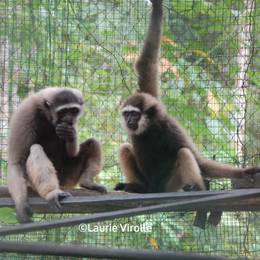
Gibbon en Indonésie
En Indonésie, les forêts où vivent les gibbons sont détruites à un rythme alarmant du fait de l’extraction de bois exotique et, notamment, des cultures de palmiers à huile pour la production d’huile de palme. De jeunes gibbons sont par ailleurs régulièrement capturés pour alimenter le marché des animaux de compagnie. Plus de 6 000 gibbons seraient détenus illégalement, sur les îles de Bornéo, Java et Sumatra.
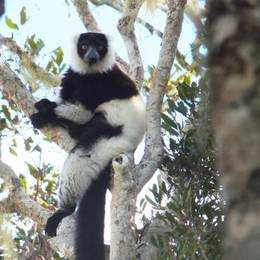
Protéger 6 espèces de lémuriens à Madagascar
Les 6 espèces « en danger critique d’extinction », protégées par la Fondation Aspinall, se trouvent dans les forêts tropicales de Madagascar. Parmi les espèces évaluées par l’IUCN, 98 % des espèces de lémuriens sont menacées d’extinction, à des niveaux différents. Leur disparition est principalement due à la destruction de leur habitat, causée par l’agriculture sur brûlis et l’exploitation forestière illégale.
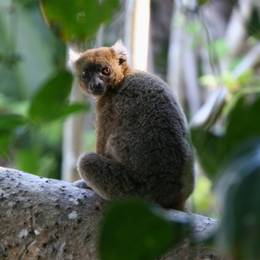
Grand hapalémur à Madagascar
Le grand hapalémur (Prolemur simus) est l’un des lémuriens les plus menacés de Madagascar. Endémique de l’île et autrefois largement réparti dans toute l’île, on ne le trouve plus aujourd’hui que dans les forêts humides de l’Est de Madagascar où seulement 600 individus ont été recensés en 2021. Il subsisterait un effectif total d’environ 1300 individus à Madagascar, selon l’association Helpsimus.
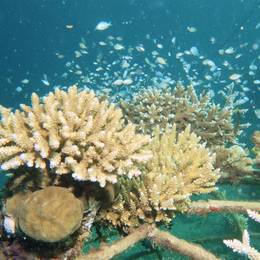
Coraux à Bali
Les récifs coralliens comptent parmi les écosystèmes les plus importants du monde en termes de biodiversité, mais diminuent rapidement à l’échelle globale de la planète. Ce déclin est particulièrement visible dans le lagon de Pejarakan, un petit village situé à l’ouest de Bali en Indonésie.
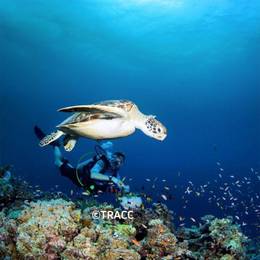
Tortues marines au Nigéria
Présentes dans les mangroves du Nigeria, la tortue caouanne (Caretta caretta), la tortue luth (Dermochelys coriacea) et la tortue olivâtre (Lepidochelys olivacea) sont menacées d’extinction principalement à cause de la destruction de leur habitat et de leurs sites de pontes. Beauval Nature s’est engagée auprès du Tropical Conservation Center.
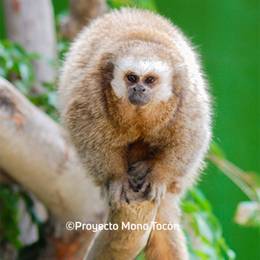
Titi des Andes au Pérou
Classé « en danger critique » d’extinction selon l’UICN, le titi des Andes (Callicebus oenanthe) ne vit que dans la forêt tropicale d’altitude d’Alto Mayo, au centre du Pérou. Ces forêts ont été détruites à un rythme alarmant durant les dernières décennies au profit des diverses cultures (café, cacao, riz), de l’élevage du bétail et de l’exploitation du bois.
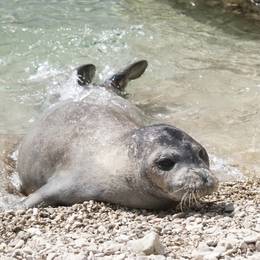
Phoque moine en Mauritanie
La Fondation Marineland s’implique dans un projet de conservation du phoque moine en Mauritanie contribuant à améliorer le statut de conservation de l’espèce, en assurant sa protection et celle de son habitat. Avec l’aide des autorités locales, une patrouille de surveillance permanente contrôle les eaux mauritaniennes.
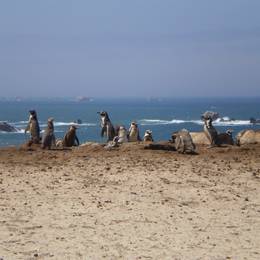
Manchot de Humboldt au Pérou
Présents exclusivement sur les côtes du Pérou et du Chili, les manchots de Humboldt ont vu leurs effectifs diminuer rapidement ces 30 dernières années. Accueillant l’une des plus importantes colonies de manchots, la réserve péruvienne de Punta San Juan fait l’objet de récoltes de guano, excrément utilisé par les cultivateurs locaux comme engrais organique. Ces récoltes incontrôlées détruisent nids et pontes, produisant un impact négatif sur le cycle de reproduction des manchots et leur survie.
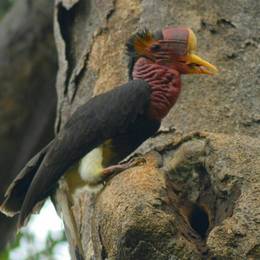
Commerce illégal en Indonésie
L’Indonésie a dernièrement été répertoriée par les autorités locales comme le pays d’Asie du Sud où le commerce illégal d’animaux sauvages est le plus important. Un rapport de mission a révélé que sur une seule journée, plus de 19 000 oiseaux issus de la faune sauvage étaient vendus sur les marchés de Jakarta. Afin de lutter contre ce fléau, la Scorpion Foundation, soutenue par Beauval Nature, a pour mission de quantifier précisément le nombre d’animaux sauvages victimes du commerce illégal.
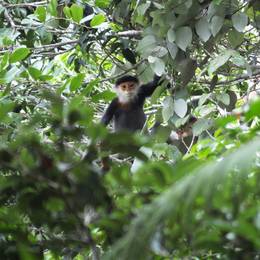
Langur de Douc au Laos
Espèce classée « En danger critique d’extinction » par l’UICN, le langur de Douc (Pygathrix nemaeus) est menacé dans toute son aire de répartition en raison de la perte d’habitat, en particulier au Vietnam, où les populations sont fragmentées, voire localement éteintes. La chasse et les besoins de la médecine traditionnelle contribuent fortement à la diminution de ses effectifs.
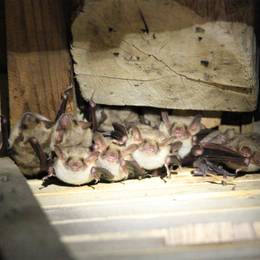
Chauves-souris en Loir-et-Cher
Les effectifs des 34 espèces de chauves-souris présentes sur le territoire français ont fortement diminué au cours du 20ème siècle. Toutes sont aujourd’hui protégées par la législation française.
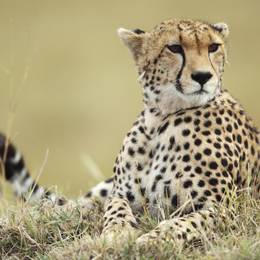
Félins au Niger
La biodiversité du parc national du W est menacée par le braconnage et l’ensemble des activités humaines telles que la transhumance, l’agriculture, la coupe de bois ou encore la pêche. Beauval Nature a ainsi collaboré avec l’Association des Campements Touristiques pour l’Appui à la Gestion du Parc Régional W (ACTAG-PRW) au Niger.
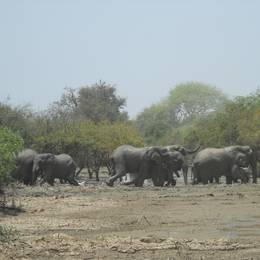
Éléphant au Cameroun
Causée par l’expansion continue de la population humaine et la conversion rapide des terres, la destruction de l’habitat des éléphants au Cameroun oblige souvent les pachydermes à se nourrir des cultures des villageois, augmentant les conflits hommes-éléphants. L’association Des Éléphants & des Hommes a mis en place le programme « Mon Voisin Éléphant », auquel l’association Beauval Nature a apporté son soutien.
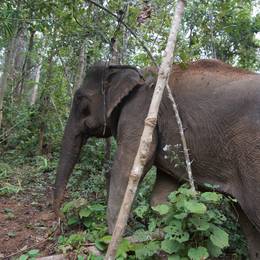
Éléphant au Laos
Perte de son habitat, braconnage pour l’ivoire, taux de natalité extrêmement bas des éléphants de cornacs (en raison des cadences qui leur sont imposées dans les exploitations de bois), manque de personnel médical sur place… l’éléphant pourrait bien disparaître du Laos d’ici une trentaine d’années.
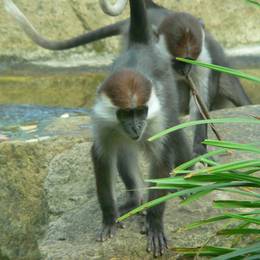
Colobe, cercopithèque, cercocèbe en Côte d'Ivoire
Située au sud-est de la Côte d’Ivoire, la forêt des marais de Tanoé mérite la plus grande attention pour la conservation de trois espèces de primates qui pâtissent des activités humaines et se trouvent en danger d’extinction : le colobe de Miss Waldron, le cercopithèque Diane et le cercocèbe couronné.
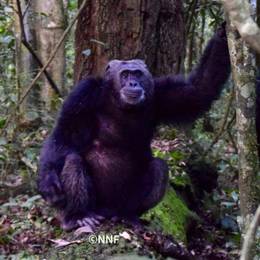
Chimpanzé de l'Est en Ouganda
Le parc national de Kibale héberge la plus grande population contiguë de chimpanzés de l’Est (Pan troglodytes schweinfurthii) . Selon le gouvernement ougandais, 95% des habitants du parc national dépendent exclusivement du bois pour l’énergie La New Nature Foundation a développé un programme de gestion énergétique pour les populations locales.
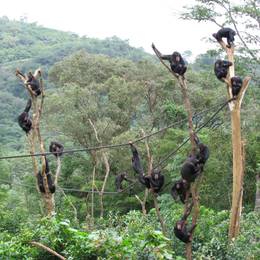
Chimpanzé de l'Ouest en Sierra Leone
Braconnage, chasse pour la viande de brousse, abattage des forêts… Les effectifs de chimpanzés de l’Ouest ont considérablement diminué au cours des dernières années. Le Sanctuaire de Tacugama accueille des chimpanzés victimes du commerce illégal et de la déforestation. Avec le soutien de Beauval Nature, Tacugama a effectué un recensement des chimpanzés de Sierra Leone et identifié des zones de réintroduction potentielles pour les animaux du sanctuaire.
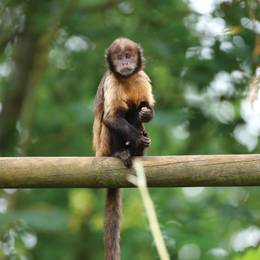
Capucin à poitrine jaune au Brésil
Le capucin à poitrine jaune est endémique de la Forêt Atlantique, un biome brésilien très menacé. Par l’intermédiaire de l’IPE (Instituto de Pesquisas Ecológicas), Beauval Nature a soutenu un programme visant à suivre des capucins équipés de colliers-émetteurs afin de déterminer leur aire de distribution et de décrypter leurs comportements.
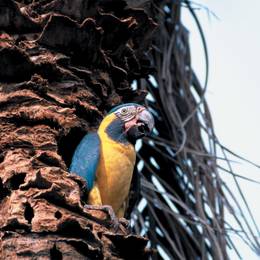
Ara à gorge bleue en Bolivie
L’ara à gorge bleue est considéré comme l’une des espèces d’oiseaux les plus menacées au monde. La déforestation, les captures pour le commerce et la compétition avec d’autres perroquets pour les sites de nidification sont les causes de sa disparition. En collaboration avec la Fondation Loro Parque, Beauval Nature a œuvré pour la sauvegarde de cette espèce.
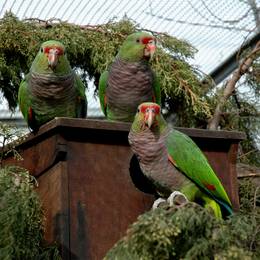
Amazone vineuse en Argentine
Les amazones vineuses évoluent dans une région où pousse le pin du Paraná, une espèce de conifère produisant des pommes dont ils se nourrissent. La disparition de cet arbre à cause de la déforestation provoque la perte des perroquets. En collaboration avec la Fondation Temaikèn, Beauval Nature a participé à un projet de conservation et de réintroduction de l’espèce.